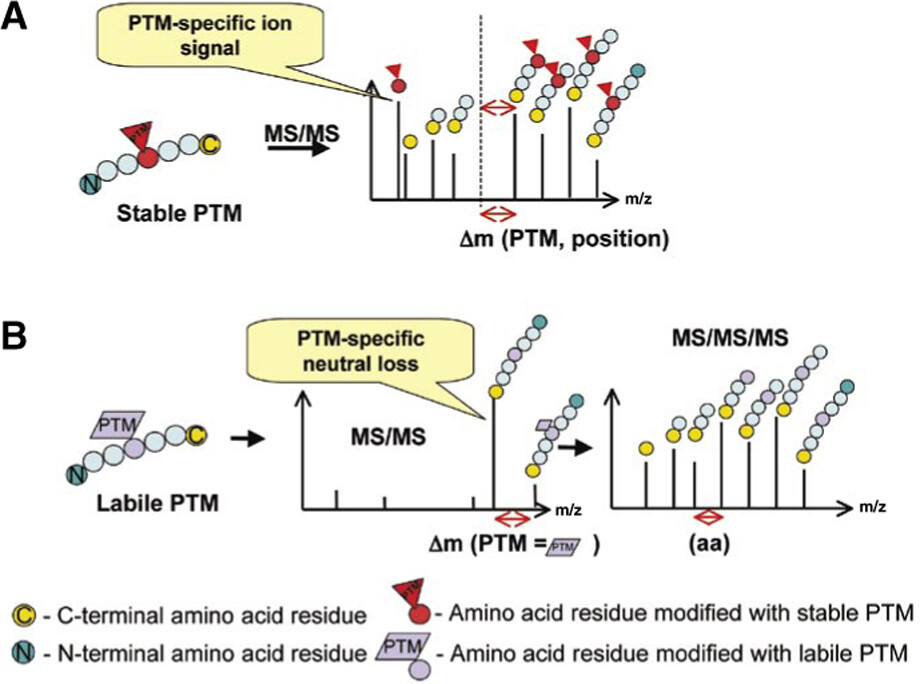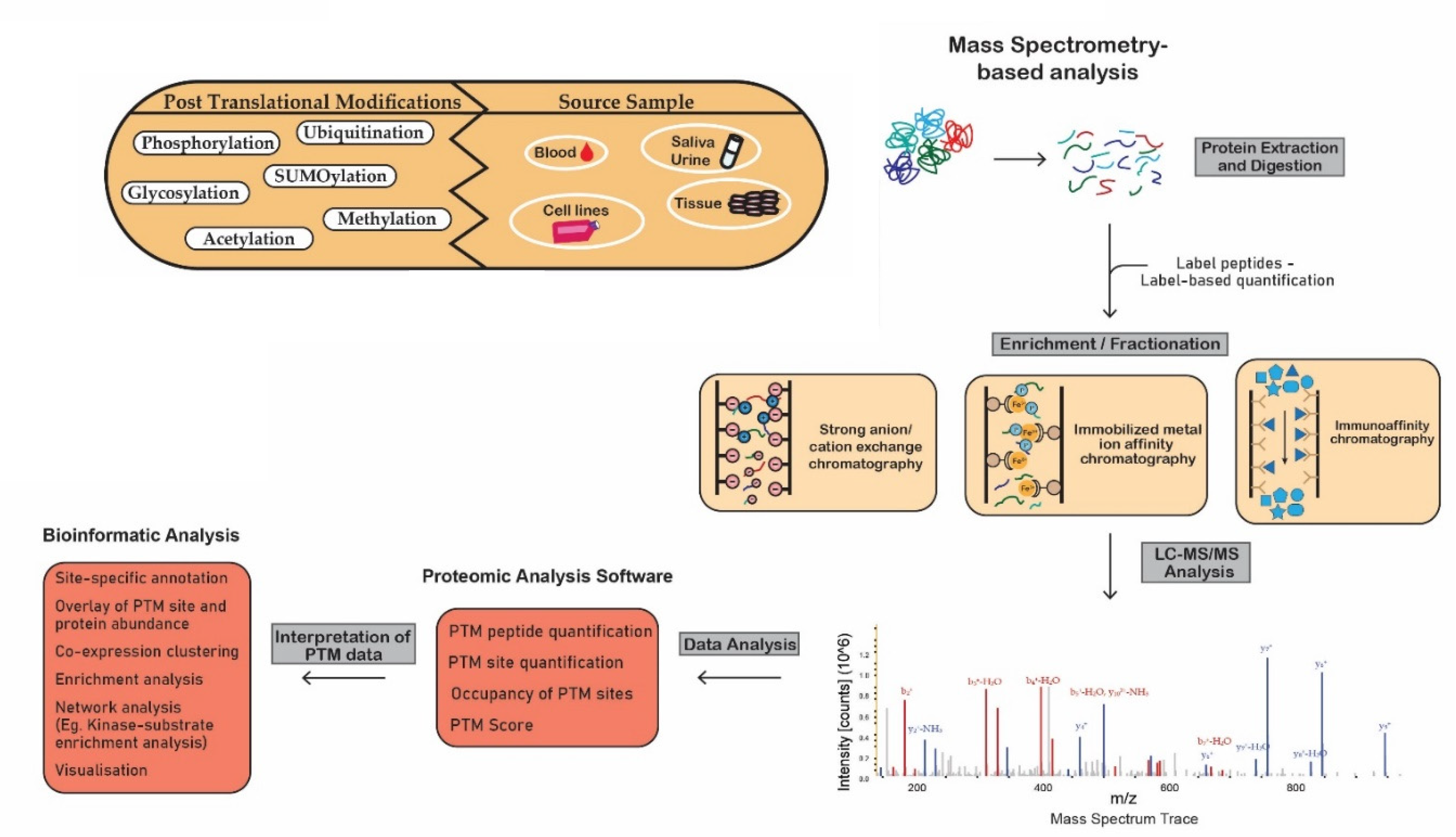MS-Based Post-Translational Modification Analysis Service
MS-Based Post-Translational Modification Analysis Service refers to a specialized analytical platform that utilizes high-resolution mass spectrometry to systematically identify, localize, and quantify protein post-translational modifications (PTMs). This service enables comprehensive detection of specific or multiple PTMs through top-down, bottom-up, and middle-down strategies.
Post-translational modifications are essential regulatory mechanisms of protein function, directly involved in key biological processes such as signal transduction, subcellular localization, and enzymatic activity modulation. Common PTM types include phosphorylation, acetylation, ubiquitination, glycosylation, methylation, and lactylation. Their dynamic alterations are closely associated with the onset and progression of various diseases.

Larsen MR. et al. BioTechniques. 2006.
Mass spectrometry (MS) is a technique that measures ions based on their mass-to-charge ratio (m/z), offering high sensitivity and high resolution for detecting proteins or peptides within complex mixtures. By combining MS data with database searching, it enables the identification of peptide sequences and post-translational modifications (PTMs). MS-based PTM analysis is currently one of the most powerful tools for systematically deciphering protein modification networks, characterized by its high throughput, high sensitivity, and compatibility with diverse modification types.
Leveraging advanced chromatographic and mass spectrometry platforms, MtoZ Biolabs provides MS-Based Post-Translational Modification Analysis Service for high-sensitivity, site-specific identification and quantification of various PTMs, including phosphorylation, acetylation, ubiquitination, and glycosylation, helping researchers to systematically analyze the dynamic changes of modification networks and deeply reveal the regulatory mechanism of protein function.
Analysis Workflow

Dunphy K. et al. Cancers. 2021.
The general workflow of MS-Based Post-Translational Modification Analysis Service (bottom-up strategy) is as follows:
1. Protein Extraction and Digestion
Total proteins are extracted using appropriate lysis buffers based on sample type, followed by enzymatic digestion to generate high-quality peptides.
2. Post-Translational Modification Enrichment
Targeted enrichment is performed for the specific modification of interest.
3. Mass Spectrometry Analysis
High-resolution mass spectrometry is used to analyze the enriched peptides.
4. Data Analysis
Specialized software is employed for peptide matching, modification identification, site localization, quantification, and functional enrichment analysis.
Service Advantages
1. Comprehensive Coverage of Diverse Modifications: Supports the analysis of a wide range of common and novel post-translational modifications to meet the needs of multidimensional protein regulation research.
2. Optimized Enrichment Strategies and Sample Preparation: Utilizes efficient approaches such as affinity enrichment, immunoprecipitation, TiO₂ enrichment, and HILIC, combined with optimized pretreatment workflows to enhance the detection of low-abundance modified peptides.
3. Multi-Level Quantitative Capability: Enables relative or absolute quantification at the protein and modification site levels using either labeling strategies (e.g., TMT, iTRAQ) or label-free methods.
4. Advanced Analysis Platform: MtoZ Biolabs established an advanced MS-Based Post-Translational Modification Analysis Service platform, guaranteeing reliable, fast, and highly accurate analysis service.
5. One-Time-Charge: Our pricing is transparent, no hidden fees or additional costs.
6. High-Data-Quality: Deep data coverage with strict data quality control. AI-powered bioinformatics platform integrates all MS-Based Post-Translational Modification Analysis Service data, providing clients with a comprehensive data report.
Sample Submission Suggestions
Sample Type: We accept a variety of biological samples, including but not limited to purified proteins, cell lysates, tissue samples, serum/plasma, saliva/urine and other body fluids.
Storage and Transportation: -80°C frozen storage, dry ice transportation, avoid repeated freezing and thawing.
Additional Notes: If the sample contains components that may interfere with mass spectrometry analysis (glycerol, detergents, salts, etc.), please indicate so that we can perform appropriate pretreatment. If you are unsure about sample preparation, MtoZ Biolabs can provide pretreatment services or detailed guidance, please contact our technical support team.
Applications
MS-Based Post-Translational Modification Analysis Service can be applied across multiple research fields, including:
Disease Mechanism Studies
Uncover alterations in PTM patterns associated with cancer, neurodegenerative diseases, and metabolic disorders.
Signal Pathway Analysis
Track modification-regulated signaling cascades to pinpoint key regulatory nodes.
Drug Mechanism of Action Validation
Monitor how candidate drugs affect critical post-translational modification sites.
Biomarker Discovery
Identify modification sites that serve as early diagnostic or therapeutic efficacy indicators.
Characterization of Antibody Therapeutics
Evaluate how modifications such as glycosylation and deacetylation influence antibody structure and function.
Deliverables
1. Comprehensive Experimental Details
2. Materials, Instruments, and Methods
3. Total Ion Chromatogram & Quality Control Assessment (project-dependent)
4. Data Analysis, Preprocessing, and Estimation (project-dependent)
5. Bioinformatics Analysis
6. Raw Data Files
Related Services
Post-Translational Modifications Proteomics Service
Quantitative Phosphoproteomics Service
Glycoproteome Analysis Service
Protein Disulfide Bonds Identification and Quantitative Analysis
How to order?







